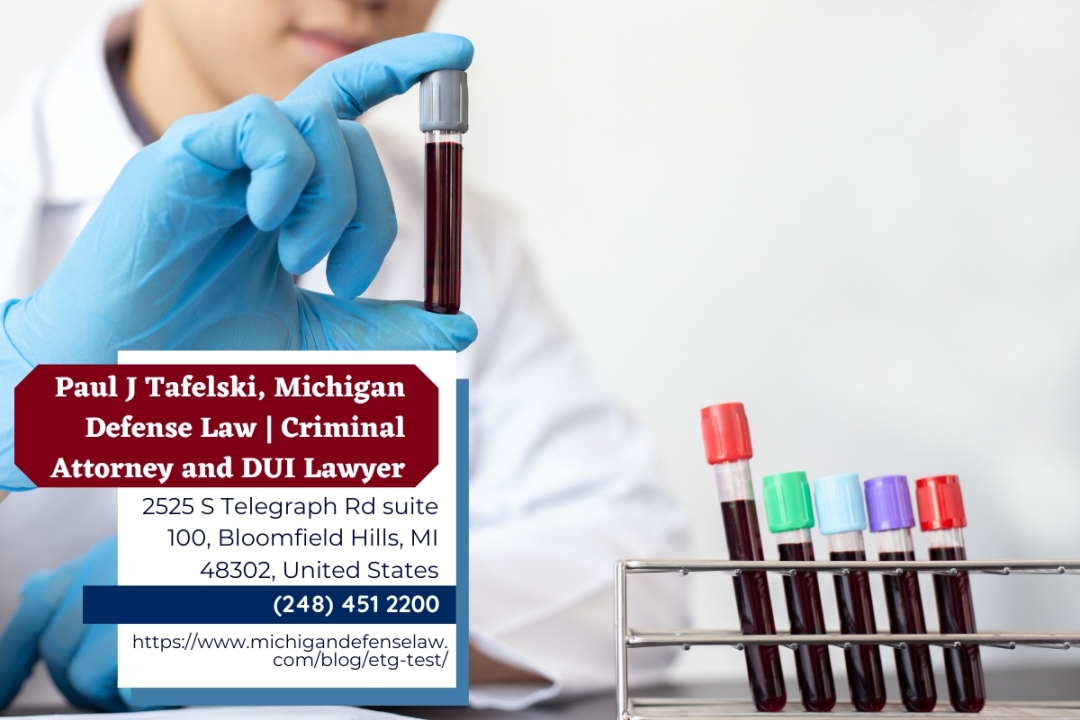Paul J. Tafelski (https://www.michigandefenselaw.com/blog/etg-test/), an Oakland County criminal defense lawyer from Michigan Defense Law, highlights the complications surrounding the use of EtG tests in probation cases. The EtG test, or ethyl glucuronide test, is often used by Michigan probation officers to detect alcohol consumption in individuals under probation. However, Tafelski explains that this method, while widely used, raises significant concerns about its accuracy and reliability in legal proceedings.
The EtG test has gained popularity due to its ability to detect alcohol consumption for up to 80 hours after ingestion. Probationers in Michigan are frequently subjected to these tests, either as part of a scheduled check or without prior notice. Oakland County criminal defense lawyer Paul J. Tafelski warns that a failed EtG test can lead to probation violations, potentially resulting in severe consequences such as extended probation, additional restrictions, or even incarceration.
While the intention behind the EtG test is to promote accountability among probationers, the Oakland County criminal defense lawyer emphasizes the risk of false positives. Products containing trace amounts of alcohol—such as hand sanitizers, mouthwash, or certain medications—can trigger a positive result. This raises serious questions about the fairness of using such tests as definitive proof of probation violations.
Tafelski points to official advisories and studies that have questioned the reliability of the EtG test. The U.S. Substance Abuse and Mental Health Services Administration (SAMHSA) issued a 2006 advisory cautioning against using EtG tests as the sole basis for disciplinary actions. Additionally, a 2009 study published in Forensic Science International found that the EtG test was not a reliable indicator of alcohol consumption.
“The main problem with the EtG test is that it’s actually too sensitive,” Tafelski explains. “While it does detect alcohol in urine, it cannot determine the source of that alcohol. This means that using hand sanitizer or other everyday products could cause someone to fail the test, even if they haven’t consumed any alcoholic beverages.”
According to the Oakland County criminal defense lawyer, probation officers in Michigan continue to rely on the EtG test despite its flaws. He stresses that probationers who fail an EtG test must take immediate action to protect their rights.
Tafelski advises individuals facing probation violations due to a failed EtG test to challenge the validity of the results. He points out that under Michigan law, those accused of probation violations have the right to a hearing where they can dispute the evidence presented against them. Unlike a criminal trial, a probation violation hearing requires a lower burden of proof, making it even more important to question the reliability of test results.
In addition to SAMHSA's concerns, other organizations have raised red flags about the EtG test’s sensitivity. One significant issue is its inability to distinguish between ethanol from alcoholic beverages and ethanol present in everyday products. This lack of distinction can lead to unjust penalties for probationers who may be adhering to their abstinence requirements.
Tafelski reiterates that probation violations should never be taken lightly, as they can have long-lasting consequences on a person’s life and freedom. He emphasizes that the EtG test should not be the sole determining factor in such serious legal matters.
For those who have failed an EtG test, Tafelski suggests consulting an Oakland County criminal defense lawyer immediately. A skilled attorney can help challenge the test results, present mitigating evidence, and advocate for a fair hearing in court.
The discussion around the EtG test brings attention to broader concerns about the tools used to enforce probation conditions. It raises the question of whether the justice system should continue to rely on testing methods that have been criticized for their accuracy.
At Michigan Defense Law, Paul J. Tafelski and his team are committed to defending the rights of those accused of probation violations. They work diligently to challenge unreliable evidence and help their clients achieve the best possible outcomes. Tafelski underscores the importance of exploring all available defenses to ensure that probationers are not unfairly penalized based on questionable test results.
For individuals accused of probation violations due to a failed EtG test, the stakes are high. Addressing the issue promptly with the assistance of a qualified Oakland County criminal defense lawyer can make a critical difference in the outcome of their case.
About Michigan Defense Law:
Paul J. Tafelski is a criminal defense lawyer serving Oakland County and the greater Michigan area. With extensive experience in defending individuals accused of various crimes, including probation violations, he is dedicated to protecting his clients' rights and achieving favorable legal outcomes. Michigan Defense Law provides legal representation in a range of criminal cases, including those involving DUI, drug offenses, and probation issues.
Embeds:
Youtube Video: https://www.youtube.com/watch?v=LbaEwsly83U
GMB: https://www.google.com/maps?cid=7441820969606749572
Email and website
Email: paul@michigandefenselaw.com
Website: https://www.michigandefenselaw.com/
Media Contact
Company Name: Michigan Defense Law
Contact Person: Paul J. Tafelski
Email: Send Email
Phone: (248) 451-2200
Address:2525 S Telegraph Rd suite 100
City: Bloomfield Hills
State: Michigan 48302
Country: United States
Website: https://www.michigandefenselaw.com/






